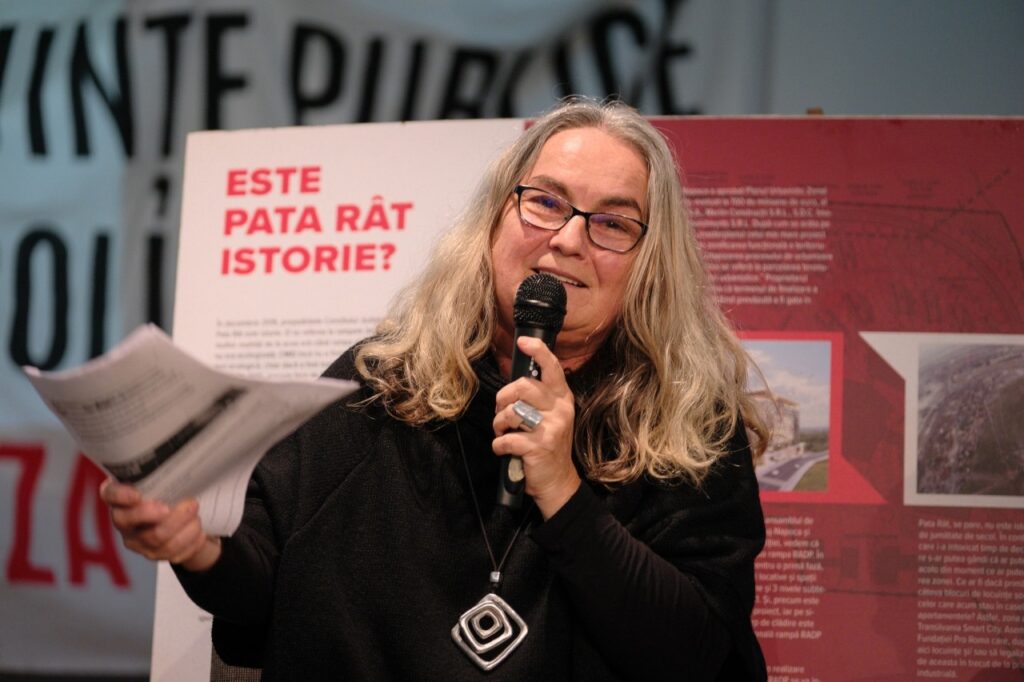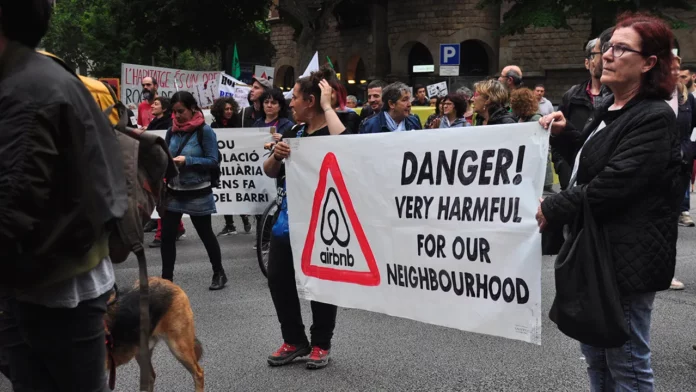Enikő Vincze, a distinguished scholar in urban and housing studies, is a prominent figure in the housing justice movement in Romania. Her involvement with the Cluj-based movement Căși Sociale ACUM!/Social Housing NOW! has led to numerous direct interventions at local, national, and European levels. Her research, driven by a deep understanding of the structural causes of the housing crisis, has been instrumental in shaping the group’s actions. She is an advocate of a political imagination for a socialist alternative to capitalism as a context in which solutions to the housing crisis might be envisioned based on the need to create a significant public housing stock and to definancialize housing production and distribution.

Q: Enikő, recently, the mayor of Barcelona announced a ban on short-term rentals by 2028. Can you tell us about this decision and how it came about?
EV: The recent decision of the center-left mayor of Barcelona, Jaume Collboni, representing the pro-independence Catalan socialist party (PSC), concerns ending by 2028 the licenses of more than 10,000 apartments currently functioning as short-term rentals in Barcelona.
This came after the eight-year governance of the radical mayor Ada Colau. Since 2015, as the lower-income people of Barcelona have become increasingly concerned about the impact of their city’s touristification on rising housing market prices, Colau’s council banned new tourist flats from opening throughout the city and limited hotels in the city center. In parallel with the victories of municipal socialists, in the post-crisis recovery years, Barcelona also became a location where a rentier middle class linked to tourism and property ownership could flourish.
Moreover, in April and May 2024, large protests against mass tourism took place in Spain’s Canary Islands. They exposed that, for example, in 2023, 13.9 million tourists visited the seven main islands, which is about six times more than the islands’ population of 2.2 million. These protests could have also informed the position of PSC at high levels, manifested in the decision of the current Barcelona mayor about ending the touristification-related short-term rentals in the city during the next four years.
Thirdly, by this decision, the mayor actually announced that he is putting into practice a law of the regional parliament that makes it compulsory for each city with touristic housing to elaborate a new urban plan in the next five years to change how touristic licenses work.
Q: Is there a housing movement in the Spanish State and Barcelona that influenced this decision?
EV: Yes, in Barcelona (and Spain), there is a strong housing movement that focuses on several aspects of the housing crises; however, as far as I know, they, or some of them, consider that the measures proposed now by the neoliberal social democrats do not solve the housing crises.
One of the most known housing initiatives is the Platform of People Affected by Mortgages (PAH), active in several cities of the country, which, starting in 2009, was the engine of anti-eviction actions contesting the right of banks to foreclose the homes of indebted people while the state saved these financial institutions in the context of the 2007-2008 global financial crises. Barcelona became a rare case in Europe where activist concerns could be transposed into the agenda of municipal government. Ada Colau started as a spokesperson for PAH and acted as Barcelona’s mayor for two mandates, during which the municipality ran a record investment in the construction of social housing. As a result, the city’s public housing stock increased from 7,600 flats in 2015 to more than 11,000 in 2022. Recently, PAH has been re-organizing for actions against vulture funds, which became increasingly prominent in Spain in the context of the post-2014 restructuring of the financialized housing market.
Since 2015, as the country’s housing regime started to change from a super-homeownership model (delegitimized by the 2007-2008 banking and mortgage crises) into a system where private rental rates continued to increase, new housing initiatives appeared. In this new context, the Sindicat de Llogateres, an organization created in 2018 in Catalunya, fights for tenants’ rights, i.e., to stop rent rises and to protect the tenants faced with abusive landlords. In 2019, they won the first lawsuit against a vulture fund due to abusive clauses in renting contracts. By then, Azora, the parent company of Lazora, owned 13,000 houses and was the manager of 20,000 residential units across Spain. This was the first time when a local judge condemned the inclusion of abusive clauses, admitting they are the basis of the imbalance between landlords and tenants in renting contracts.
Q: What is the current housing situation in the Spanish State and Barcelona?
EV: According to data from Idealista, Spain’s house prices continue to increase despite weakening property demand and a slowing economy. Nationwide house prices rose by 7% (3.68% inflation-adjusted) in Q1 2024 from the previous year, which followed a full-year growth of 8.16% (4.9% inflation-adjusted) in 2023. The percentage of social housing from the total housing stock is only around 2%.
Additionally, according to the Spanish National Institute, as of July 2021, 15.9% of households in Spain resided in a rental home, a percentage 2.4 points higher than that of the 2011 census (when it was 13.5%). On the other hand, 75.2% of households resided in a home they owned, compared to 78.9% in 2011.
Moreover, as an article from April 2021 affirms: “rentership rates are higher in larger provinces. In the two largest urban areas, Barcelona and Madrid, the percentage of renters is 26% and 24%, respectively. In smaller urban areas, this percentage is less than 15%.” Another characteristic of the Spanish rental housing market is that traditionally these residences were owned by individuals; “only recently have more professional landlords entered the market, including foreign capital firms similar to real estate investment trusts (REITs). Private firms devoted to the rental housing business represented around 10% of the national rental market in 2018. These firms have a larger presence in big cities, making up 25% of rental housing in Barcelona. Some of these new rental units have been added to the short-term rental market (e.g., Airbnb rentals), so they have not increased the amount of long-term rental housing.”
Q: Is this measure sufficient to address the housing crisis? In your opinion, what are the main causes of this crisis, and what solutions could address them?
EV: In light of the causes of the housing crisis suggested above, the measure proposed by the current mayor of Barcelona is far from being enough to solve it. The short-term rental housing market, which contributes to keeping prices high and rising on the private rental market generally, is only one of the causes. Treated separately, it cannot solve what it promised and even postpones the solutions that would respond to the complexity of factors creating the problem.
A root cause of the recent housing crises in Spain is related to how private rental has expanded in this country in the past ten years as a false promise to solve the crises generated around the old home-ownership model. While doing so, it created new investment opportunities for institutional landlords and investment funds, as well as more financialization and more sophisticated forms of financialization that work as engines of continuous price rises on the housing market and increasing housing unaffordability. I would say this case reflects a general law of capitalism: it solves crises by creating the conditions for further crises.
Collboni’s argument for his measure stressed that ceasing to be rented out as short-term rentals for tourists, the 10,000 apartments might return to the market to be used as primary housing for local residents. He declared in an interview that the proposed measure would provide more housing supply as a solution to the housing affordability crises. However, the past years proved that the increase of housing supply without the regulation of the market and without the decrease of the effects of financial actors on the residential market cannot solve this crises because it is caused by economic processes and state politics that transform housing into an asset.
Collhoni’s proposed measure, even if celebrated as a victory of anti-touristification struggles, shows that the reformist programs of neoliberal social democrats cannot solve the historic housing crisis. I also stressed this idea in a study conducted at the beginning of 2024 for The Left of the European Parliament, concluding that to radically solve the housing crisis endemic to capitalism, we need to look for socialist alternatives to this political and economic regime.



